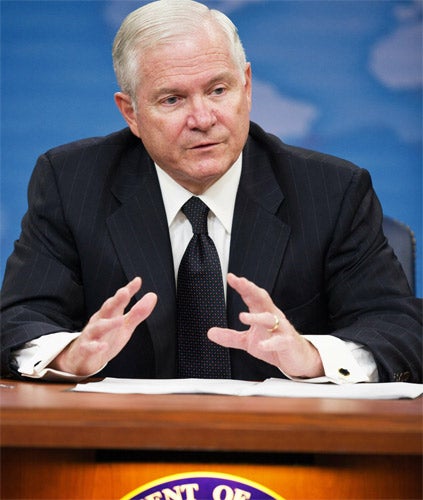Gates faces political battle over defence cuts

Robert Gates, the US Defence Secretary, faces a fierce political battle after announcing cuts in America's military spending of $100bn over the next five years, at the cost of thousands of outsourced civilian contracting jobs, and the elimination of an entire military command.
The moves planned by Mr Gates essentially take an axe to the Pentagon's sprawling bureaucracy, to free up money to strengthen America's forces on the ground. Total military spending, currently running at some $700bn (£440bn) annually if the wars in Iraq and Afghanistan are included, would still continue to rise, he hopes – but by much less than the 7 per cent average in recent budgets.
The most dramatic single step would be the dismantling of US Joint Forces Command, based in Norfolk, Virginia, where 2,800 military and civilians are employed as well as 3,300 private contractors, and whose functions would be taken over by the Pentagon itself.
In all Mr Gates wants to cut outlays for private contractors, outside those in war zones, by 10 per cent. He is also seeking to trim the ranks of admirals and generals, currently at over 1,000, by at least 50 positions, and thin the ranks of the Pentagon's central civilian bureaucracy, the Office of the Secretary of Defence.
Officials yesterday were describing the move as a "pre-emptive strike" to head off demands for even greater cuts in the Pentagon budget, as pressure intensifies on President Barack Obama to tackle the federal deficit, now set to hit $1.4 trillion (£880bn) for 2011, well above earlier estimates.
Unveiling his proposals, Mr Gates made clear the last thing he wanted was an actual cut in America's defence spending, which currently exceeds that of the world's 10 next largest national military budgets combined.
"My greatest fear is that in economic tough times that people will see the defence budget as the place to solve the nation's deficit problems," he said.
Mr Gates is the lone holdover from the Bush era in the top echelons of the Obama administration, and over his near four years in the job has fought hard to trim the fat from the Pentagon. He has cancelled or curtailed programmes reflecting outdated Cold War priorities, notably by capping production of the F-22 Raptor fighter jet at 187 aircraft. But the enduring strength of what President Eisenhower described as the "military/industrial complex" always makes such steps complicated – and these cuts will be no exception.
Politicians of every hue from Virginia, likely to be hardest hit by the Gates plan, were united in opposition, as Mark Warner, a former governor of the state and now one of its two senators in Washington, insisted there was "no rational basis" for closing US Joint Command. His colleague James Webb, also a Democrat, warned that the move could "be harmful to the capabilities of the finest military in the world". And Randy Forbes, a Republican Congressman from Virginia, declared that the White House was "selling off our military at auction to pay for its social programmes".
Subscribe to Independent Premium to bookmark this article
Want to bookmark your favourite articles and stories to read or reference later? Start your Independent Premium subscription today.

Join our commenting forum
Join thought-provoking conversations, follow other Independent readers and see their replies